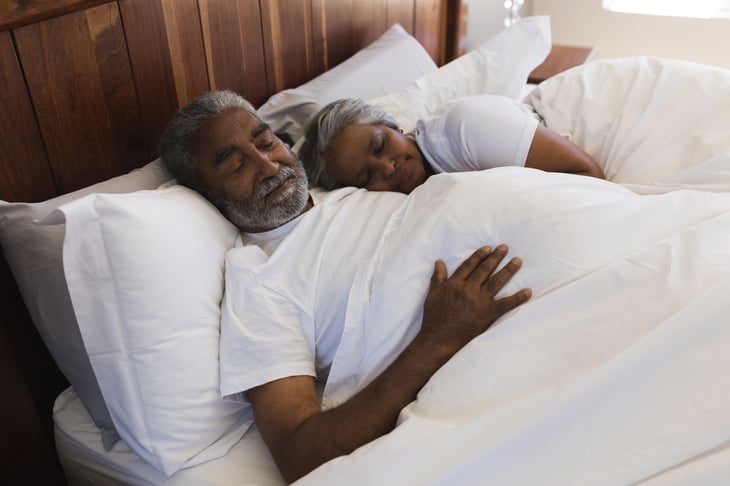
The Benefits of Healthy Sleep
Updated from the original publication on March 16, 2023.
A good night’s rest can be hard to come by for many people, especially as we grow older. Research shows that up to 30% of the general population, and as much as 50% of seniors, suffer from insomnia. From a lack of exercise to sleep apnea, heart disease, and restless legs syndrome, there are a variety of reasons why so many of us just can’t sleep.

With age sometimes comes a shift in the body’s circadian rhythm. That’s one reason why an older adult might have difficulty falling and staying asleep. Many seniors simply give up and accept that quality sleep just isn’t possible any longer. Unfortunately, there are several negative health consequences associated with a chronic lack of restful sleep:
- Unintentional weight gain or loss
- Greater risk of a fall
- Increased incidence of diabetes
- Higher occurrence of cardiac disease
- Depression or change in disposition
- Weakened immune system
By contrast, the benefits of sleeping well are numerous.
Why Quality Sleep Is Good for Your Health
Because sleep is so important, here are a few reasons why it’s critical to find ways to overcome sleep disorders at every age:
- Stronger immunity: Quality sleep pumps up the immune system, helping to prevent colds and viruses. This is especially important during cold and flu season, and while concerns about COVID-19 linger.
- Better self-control: When you are tired and sleepy, finding the motivation to stick to a healthy diet can be tough. Comfort foods, such as carb-laden dinner entrees and baked goods, sound more appetizing when you aren’t feeling your best. When you are well-rested, you’ll likely find it easier to eat right.
- Lower your disease risk: Poor sleep is linked to several health conditions, including diabetes, heart disease, and some forms of cancer. By getting quality rest each night, you may be able to lower your risk.
- Greater sense of peace: The difference between feeling stressed or feeling calm is often dependent on whether you’ve slept well versus whether you haven’t. That’s because sleep allows your mind and body to refresh.
- Have more energy: This one might be fairly obvious, but it is still worth pointing out. Sleeping well regularly gives you more energy. It helps you stay active and engaged with life, which further enhances how positive you feel.

In honor of Sleep Awareness Week, March 12 – 18, we offer tips to help insomniacs of all ages get a good night’s rest.
5 Ways to Sleep Better at Night
- Create a peaceful sleep space: Turn off the television and electronic devices at least one hour before bedtime. Lower the thermostat setting and pull the blinds. Invest in blackout curtains if you need to darken the room. And, if you can’t drift off to sleep when the room is too quiet, try using a white noise machine or a fan.
- Exercise regularly: A sedentary lifestyle can also contribute to poor sleep. As can a lack of fitness activities. Walking, swimming, yoga, cycling, and gardening all help relax the mind and body which may help to beat insomnia. Mornings are usually the best time to work out.
- Limit caffeine: It’s something of a vicious circle when it comes to sleep deprivation and caffeine. The more tired you are, the greater the likelihood you’ll use caffeine to help you wake up. While it might give you a short-term boost, it can make it more difficult to fall asleep and stay asleep. Coffee, soda, chocolate milk, candy, and many other treats should be consumed in moderation, especially in the afternoon and evening.
- Stick to a sleep schedule: Another tip sleep specialists often suggest is to get up and go to bed at the same time each day. That includes the weekends. An irregular sleep schedule can throw off the body’s natural circadian rhythm, making a restful night less likely.
- Skip the alcohol: People often think a glass of wine with dinner might help them relax and sleep better. In reality, alcohol disrupts melatonin in the body. It disrupts your sleep/wake cycles, while also worsening conditions such as snoring and sleep apnea. It’s a combination that makes sleep disorders worse.

Subscribe to PSL’s News and Updates
If you’d like to read more articles like this one on healthy aging or topics like caregiving, senior living, and retirement planning, we encourage you to subscribe to our blog. You’ll receive the latest news and updates delivered right to your Inbox!
About Presbyterian Senior Living
As the trusted leader in aging services, Presbyterian Senior Living combines over 95 years of experience with innovative approaches to senior communities and services. Across our 27 communities in PA, MD, OH, and DE, we serve over 6,500 seniors. We are committed to: FOSTERING teamwork and responsibility. UPHOLDING integrity in every action. EMBRACING innovation to create opportunities for everyone’s success. LEADING with compassion and respect.


